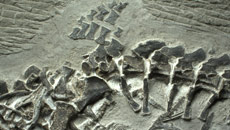Coming on the heels of recent studies that suggest destabilisation of part of the West Antarctic ice sheet has begun, a study shows that the Antarctic ice sheet began melting about 5,000 years earlier than previously thought - at the end of last ice age.
The shrinkage of the vast ice sheet accelerated during eight distinct episodes, causing rapid sea level rise, it added.
“Conventional thinking is that the Antarctic ice sheet has been relatively stable since the last ice age, that it began to melt relatively late and that its decline was slow and steady until it reached its present size,” said lead author Michael Weber, a scientist from University of Cologne in Germany.
“The sediment record suggests a different pattern - one that is more episodic and suggests that parts of the ice sheet repeatedly became unstable during the last deglaciation,” Weber added.
The researchers examined two sediment cores from the Scotia Sea between Antarctica and South America that contained "iceberg-rafted debris”.
Periods of rapid increases in iceberg-rafted debris suggest that more icebergs were being released by the Antarctic ice sheet.
The researchers discovered increased amounts of debris during eight separate episodes beginning as early as 20,000 years ago, and continuing until 9,000 years ago.
The melting of the Antarctic Ice Sheet was not thought to have started, however, until 14,000 years ago.
The research also provides the first solid evidence that the Antarctic ice sheet contributed to what is known as meltwater pulse 1A - a period of very rapid sea level rise that began some 14,500 years ago.
"During that time, the sea level on a global basis rose about 50 feet in just 350 years - or about 20 times faster than sea level rise over the last century," noted Peter Clark, an Oregon State University paleoclimatologist.
“We do not yet know what triggered these eight episodes or pulses, but it appears that once the melting of the ice sheet began it was amplified by physical processes,” he added.
Some 9,000 years ago, the episodic pulses of melting stopped, the researchers said.
Perhaps the sheet ran out of ice that was vulnerable to the physical changes that were taking place.
“However, our new results suggest that the Antarctic Ice Sheet is more unstable than previously considered,” they emphasised in the study published in the journal Nature.





